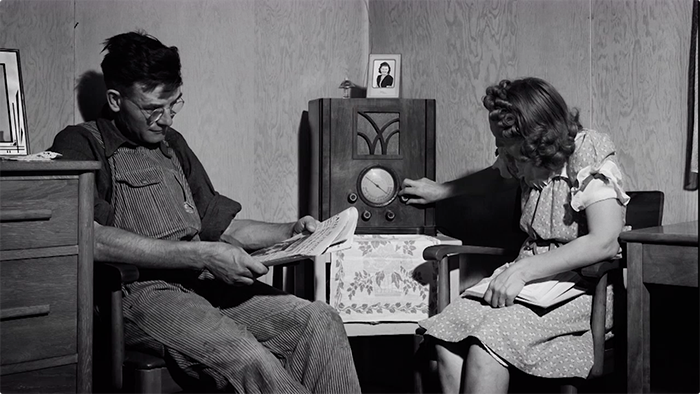
With me here in the Poughkeepsie post office is producer Catherine Winter, producer of this documentary. This post office was one of many, many post offices built by the big public works program that FDR launched in the Great Depression. We've come to the United States Post Office in Poughkeepsie, New York, which is just a few miles down the Hudson River from Hyde Park, from Franklin Roosevelt's home. Smith: Good morning, may I buy a postcard stamp please? Roosevelt's political popularity enabled him to push through big building programs that profoundly changed the country, and we are still living with those changes today. And suddenly, 70 were needed to handle the flow of correspondence. Previously there had been a mail room with one staff in it. The letters came, you know, flowing in to the White House. Koch: They listened, they responded by writing back to him, and suddenly for the first time there was a conversation with an American president. It is your problem, my friends, your problem no less than it is mine. Roosevelt: We have provided the machinery to restore our financial system and it is up to you to support and make it work. He knew that he could sit down in a room and people could gather around their radios and literally have these chats that came to be known as Fireside Chats. It wasn't something that was conversational. People had been used to listening to their politicians speaking oratorically. Koch: The radio was new technology for people. You must not be stampeded by rumors or guesses. And it's focuses on the radio addresses, the first fireside chat, on banking. Joining us on a walkthrough of the Franklin Roosevelt Museum here in Hyde Park is the library and museum's director, Cynthia Koch.Ĭynthia Koch: We're heading into the gallery that is set up to look like a 1930s kitchen.

He, like Roosevelt, wants the nation in part to build its way out of the economic downturn. Now today President Barack Obama is also trying to stimulate the national economy by repairing the nation's infrastructure and expanding it. In the Great Depression of the 1930s, Franklin Roosevelt's administration launched an enormous unprecedented campaign of national construction. Tour Guide: Because a lot of the things that were happening when Franklin Roosevelt was president are happening now.įrom American Public Media, this is an American RadioWorks documentary: "Bridge to Somewhere," produced in cooperation with public television's Blueprint America project and. Tour Guide: What do you think about when you think about the New Deal, what kinds of programs that he enacted?Ī lot of people in America are looking back at Roosevelt and his administration and how they responded to the Great Depression as a way of understanding what America might need to do now in this time of economic crisis. We're following behind a group of high school students touring the place. Roosevelt's home in Hyde Park, New York on the country estate that he lived in a couple hours north of New York City in the Hudson River Valley.

Tour Guide:Ěll right, what school you guys from? In the coming hour, "Bridge to Somewhere" from American RadioWorks. Robert Leighninger: Waterworks and schools and parks and police offices and city halls. Gray Brechin: There are relics all around us that we just don't see. Roosevelt: our greatest primary task is to put people to work.įranklin Delano Roosevelt created jobs by building things. Stephen Smith: From American Public Media, this is an American RadioWorks documentary, produced in cooperation with public television's Blueprint America project and .įranklin Delano Roosevelt: This great nation will endure as it has endured.Įighty years ago, another President faced an economic crisis.


 0 kommentar(er)
0 kommentar(er)
